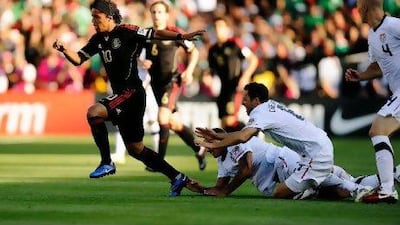It is fair to say that North America has been the least welcoming continent to association football, and it might be so even now were it not for a squalid attempt 23 years ago to cheat the system.
Alonso's footprints in Spain can be blueprint for UAE
The Ferrari driver captured the attention of a nation when he first took to the track back in 2001.
Alonso's podium plan for Abu Dhabi Read article
Vettel leads by example in Spain Read article
Premier League ambition for two Dubai teenagers Read article
For most of a century, Mexican football and North American football were pretty much the same thing. Cornish miners introduced the game to Mexico in the 1890s and the country took to it immediately, even as the United States and Canada played indigenous sports such as baseball and ice hockey.
By 1907, Mexico had a league; a few decades later a formidable national side were in operation; in 1970 and 1986 the country hosted the World Cup.
However, in 1988 Mexico used four over-age players in an Under 20 tournament and Fifa hammered the country with a two-year ban ahead of the 1990 World Cup. The United States seized the opening created by Mexico's absence and a team of amateurs dramatically qualified for Italy 1990, ending a 40-year absence from the global football stage and rescuing the game from stateside obscurity.
Mexico still rue missing the 1990 World Cup, but their omission yielded something more lasting: one of the least-recognised but most-passionate rivalries in world football.
It was renewed late on Saturday at the Rose Bowl in Southern California, when Mexico defeated the US 4-2 before 93,000 in the frenetic final to the Gold Cup, the continental championship, also earning "El Tricolores" a 2013 Confederations Cup berth in Brazil, as well as the sweet satisfaction of putting the gringos in their place - as the "other" major power of the new North America.
The US had developed the maddening habit of defeating Mexico in matches on the northern side of the border, winning nine and drawing two from 12 games since 2000, a condition El Tri's fans considered profoundly unnatural, given their birthright as North American masters of the game and football's US status as, perhaps, the fifth-most-popular sport.
The results not only indicated the US's rise in the game, it emphasised Mexican parochialism; the country's players were routinely humbled if they ventured to Europe, with the notable exception of Hugo Sanchez, and their teams were different entities when not playing on Mexican soil, and in particular at Estadio Azteca, their 120,000-capacity arena in Mexico City.
The rivalry was further fuelled by utterly divergent approaches to the game. Mexico typically pressed relentlessly, flopped theatrically and saw no harm in throwing elbows when the referee was not looking. The US were almost naively direct, ceding ball control and typically waiting to counter-attack, most memorably in a 2-0 victory over Mexico in the knockout stage of the 2002 World Cup, an event that left Mexico in mourning.
More subtext: history, economics and immigration.
In the middle of the 19th century, the US army occupied Mexico City, and about half of Mexico's land mass became US territory, forming most of six US states from California to Texas. Then, about 30 years ago, millions of Mexicans began leaving their impoverished country to live and work in the US, legally or otherwise, many of them taking low-paying jobs in big-city barrios.
In many cases, the immigrants' bodies were in El Norte but their souls remained in Mexico, and when the beloved national side played a game in the US they packed out the stadiums.
A series of such "away" games inside US borders so unnerved US Soccer, the governing body in the US, that it began scheduling World Cup qualifiers with Mexico in small stadiums in cold cities where it could channel tickets to US citizens, tactics which only further angered Mexico's fans, many of whom still made long journeys to support their team.
When the Gold Cup final was set this year for the Rose Bowl, a venue within a few miles of millions of Mexico natives, it was safe to predict the majority of tickets would land in the hands of El Tri's fans.
Indeed, one observer estimated that 80,000 of the people in the stadium were Mexico supporters, and they gleefully shouted "burro!" (donkey) when players from the home team were introduced.
El Tri's supporters were treated to an impressive performance by three of their country's international stars. Javier "Chicharito" Hernandez, the Manchester United striker, so preoccupied the US defence that Pablo Barrera scored twice, and Giovani Dos Santos scored the clinching goal.
The victory was even sweeter given that the US had vaulted to a 2-0 lead after 23 minutes thanks to Michael Bradley and Landon Donovan.
Long after the match, thousands of Mexico fans booed the US team one more time as they accepted, but did not wear, their silver medals, and cheered their heroes when they picked up gold and the trophy.
Mexico now hold a 32-11-15 advantage over the Yankees, and even if most of those 32 victories came before the history-turning episode of 1988, the most pertinent facts are those from the latest instalment of the great rivalry: Mexico 4, US 2; June 25, 2011.

